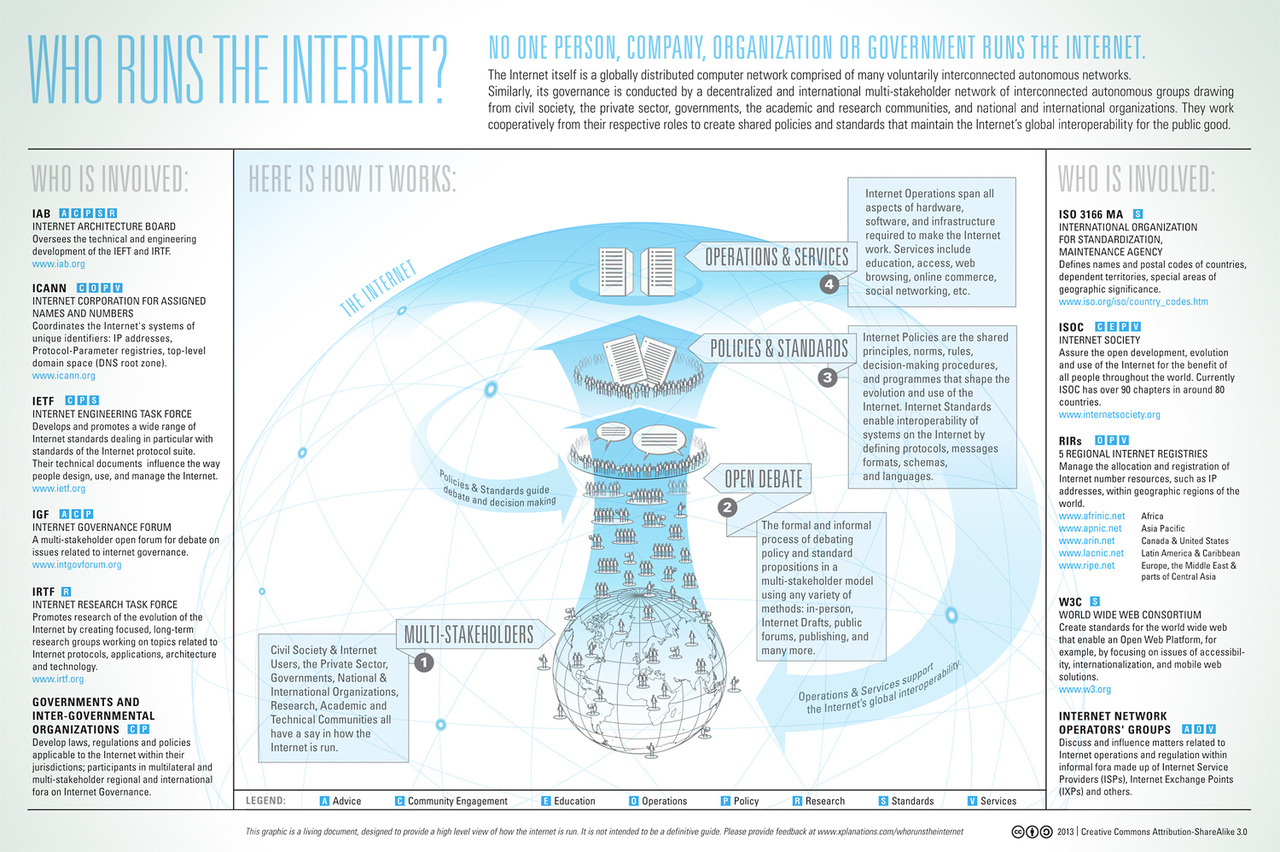
I came across the great infographic from ICANN titled, Who Runs the Internet? i want to brush up on my own knowledge about all the key stakeholders in the Internet, so I typed up some of the text from the infographic, for my own benefit, as well as to make it a little more interactive.
Who Runs The Internet?
No One Person, Company, Organization or Government Runs the Internet
The Internet itself is a globally distributed computer network comprised of many voluntarily interconnected autonomous networks. Similarly, its governance is conducted by a decentralized and international multi-stakeholder network of interconnected autonomous groups drawing from civil society, the private sector, governments, academic and research communities, and national and international organizations. They work cooperatively from their respective roles to create shared policies and standards that maintain the Internet's global interoperability for the public good.
Here is how it works:
- Operations & Services - Internet Operations span all aspects of hardware, software, and infrastructure required to make the Internet work. Services include education, access, web browsing, online commerce, social networking. etc
- Policies & Standards - Internet Policies are the shared priciniples, norms, rules, decision-making procedures, and programs that shape the evolution and use of the Internet. Internet Standards enable interoperability of systems on the Internet by defining protocols, messages formats, schemas, and languages
- Open Debate - The forma and informal process of debating policy and standard propositions in a multi-stakeholder model using any variety of methods: in-person, Internet Drafts, public forums, publishing and many more
- Multi-Stakeholders - Civil Society & Internet Users, the Private Sector, Governments, National & Internal Organizations, Research, Academic and Technical communities all have a say in how the Internet is run
Who is Involved:
- IAB - Internet Architecture Board - Oversees the technical and engineering development of the IEFT and IRTF
- ICANN - Internet Corporate for Assigned Names and Numbers - Coordinates the Internet's systems of unique identifiers: IP Addresses, Protocol-Parameter registries, top-level domain space (DNS root zone)
- IETF - Internet Engineering Task Force - Develops and promotes a wide range of Internet standards dealing in particular with standards of the Internet protocol suite. Their technical documents influence the way people design, use and manage the Internet
- IGF - Internet Governance Forum - A multi-stakeholder open forum of rebate on issues related to Internet governance
- IRTF - Internet Research Task Force - Promotes research of the evolution of the Internet by creating focused, long-term research groups working on topics related to Internet protocols, applications, architecture and technology Governments and Inter-Governmental Organizations - Develop laws, regulations and policies applicable to the Internet within their jurisdictions; participants in multilateral and multi-stakeholder regional and internal fora on Internet Governance
- ISO 3166 MA - International ORganization for Standardization, Maintenance Agency - Defines names and postal codes of countries, dependent territories, special areas of geographic significance
- ISOC - Internet Society - Assure the open development, evolution and use of the Internet for the benefit of all people throughout the world. Currently ISOC has over 90 chapters in around 80 countries
- RIRs - 5 Regional Internet Registries - Manage the allocation and registration of Internet number resources, such as IP addresses, within geographic regions of the world - Africa - http://afrinic.net, Asia Pacific - http://apnic.net, Canada & United States - http://arin.net, Latin America & Caribbean - http://lacnic.net, Europe, the Middle East & parts of Central Asia - http://rip.net
- W3C - World Wide Web Consortium - Create standards for the world wide web that enable an Open Web Platform, for example, by focusing ton issues of accessibility, internationalization, and mobile web solutions
- Internet Network Operators Groups - Discuss and influence matters related to Internet operations and regulation within informal fora made up of Internet Service Providers (ISPs), Internet Exchange Points (IXPs) and others

